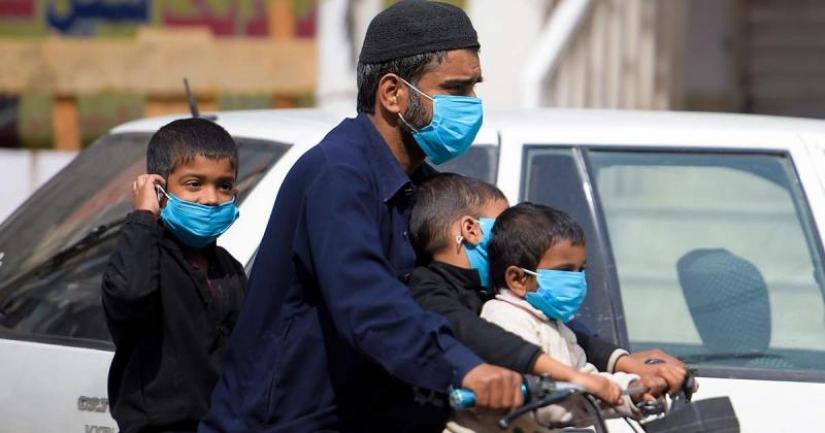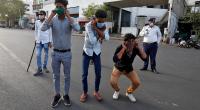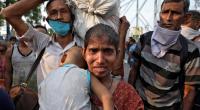Human rights organization Amnesty International has urged authorities in South Asia to intensify efforts to protect marginalized and vulnerable groups, including daily wage earners, people displaced by conflict, health workers and prisoners, who are at higher risk of contagion from the ongoing coronavirus (Covid-19) pandemic.
 In a statement released on Wednesday, Amnesty also expressed fears that the pandemic was poised to break into thousands of cases in South Asia as imposing strict lockdowns and curfews may not be enough to stop the spread with woefully inadequate healthcare facilities.
In a statement released on Wednesday, Amnesty also expressed fears that the pandemic was poised to break into thousands of cases in South Asia as imposing strict lockdowns and curfews may not be enough to stop the spread with woefully inadequate healthcare facilities.
“As the number of Covid-19 cases in South Asia soars, the region’s leaders must pay special attention to the most vulnerable and marginalized in this crisis,” Amnesty International’s South Asia Director Biraj Patnaik said in the statement.
“They need to protect the workers for whom staying at home means losing their livelihoods, people who lost their homes in conflicts and now languish in overcrowded camps, prisoners squeezed into cells with several others, and, not least, the valiant doctors and nurses who have never had the resources they need and are now putting their own health at risk to save others,” he added.
The statement also informed that this week, Pakistan reported 1,026 cases on March 25, with seven deaths so far, while India recorded the second highest with 606 cases and 10 deaths.
“The numbers are rising sharply on a daily basis and are estimated to be significantly higher than reported given the paucity of testing,” the statement said.
Plight of daily wage earners
Mentioning that a vast majority of workers in South Asia earn their living in the informal economy which often depends on daily wages, Amnesty also said these low-income groups were overwhelmingly denied their means of earning a livelihood as lockdowns came into force.
It also said that in an economically low-income region with limited social security systems in place, these groups do not have an adequate – or, in many cases, any – social safety net to fall back on.
“No one should be forced to make the pernicious choice between starvation and infection. South Asia’s economies depend on the daily toil of workers who are forced to seek their living in insecure and often inadequate working conditions,” said Biraj Patnaik.
“States must protect their livelihoods as best as they can during this crisis. In the long term, international solidarity will be needed for a recovery. This is a global pandemic and it needs a global solution,” he added.
Information and awareness
The human rights organization also slammed South Asian governments for failing to provide accessible, accurate and evidence-based information about the virus, how people can protect themselves, and what the government is doing to help them.
Amnesty International also noted in the statement that some senior government officials in different countries in South Asia had either played down the crisis, suppressed information about its true scale, or, in the most damaging cases, provided false information about the effect it has – undermining the effectiveness of any public health response and potentially their right to health.
“States have a responsibility to provide information about COVID-19 that is accurate and evidence-based, that reaches people in languages they understand through mediums they can easily access. At the same time, there must be a concerted effort to counter misinformation about the virus that could harm people and to protect marginalized communities from stigmatization,” said Biraj Patnaik.
Protection for health professionals
In the statement, Amnesty International highlighted the need for safety for health professionals in South Asia amid the pandemic, as many of them have been raising concerns regarding the lack of personal protective equipment available to them as they treat patients infected with COVID-19.
“Frontline health workers are the heroes we depend on in this crisis. They are putting the health of others first at a risk to their own. The very least they can expect is to be given the protective equipment they need. States have an obligation to ensure they are protected – including by providing appropriate training and psychosocial support, for them and their families,” said Biraj Patnaik.
Refugees and displaced population
It also expressed deep concern for refugees and internally displaced people as South Asia has one of the highest populations of refugees in the world, including three million registered and unregistered Afghan refugees in Pakistan and more than a million Rohingya refugees in Bangladesh.
“For people displaced by conflict, social distancing is not an option, health care is not easily available, and basic necessities are a daily struggle. States have an obligation to not just ensure they are included in the response to the COVID-19 crisis but to address their particular needs,” said Biraj Patnaik.
Prisons and its inmates
Noting that prisons in South Asia were highly overcrowded, the human rights organization said prisoners were also often subject to inhumane conditions, including poor ventilation and sanitation, that put their health at higher risk.
“Under international human rights law and standards, the authorities must ensure prisoners have prompt access to medical care and enjoy the same standards that are available in the community, including when it comes to testing, prevention and treatment of people infected with COVID-19,” the statement added.


